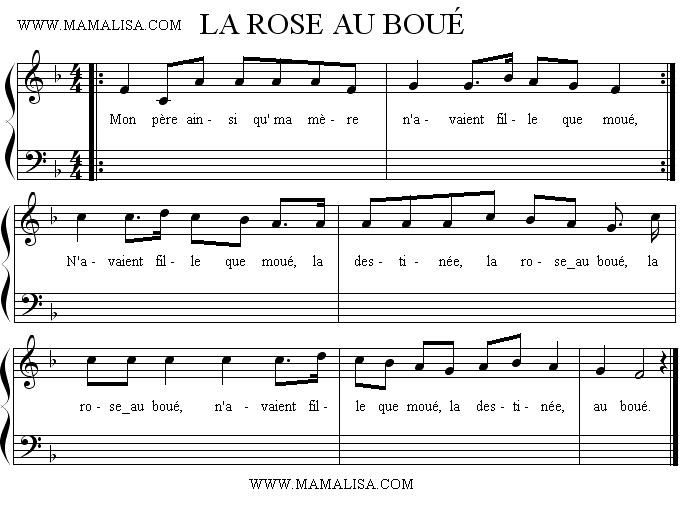La rose au boué
This song probably goes back to the 18th century. The pronunciation of "oi" (wa) as "weh" as reflected in the spelling gives the impression that the song is older. "Weh" was the standard pronunciation of "oi" (wa) in the 1600's.
You can find this in the following words: "moi" spelled moué (me), "bois" spelled boué (wood), "roi" spelled roué (king), "soie" spelled soué (silk).
If the lyrics of the chorus ever meant anything, the meaning has long been lost.
La rose au boué
The Rose In The Wood
Chanson à répondre
Call and Response Song
(French)
(English)
Mon père ainsi qu' ma mère
N'avaient fille que moué
Mon père ainsi qu' ma mère
N'avaient fille que moué,
N'avaient fille que moué,
La destinée, la rose au boué
La rose au boué
N'avaient fille que moué,
La destinée au boué*.
Ils me mirent à l'école
À l'école du Roué.
Ils me mirent à l'école
À l'école du Roué
À l'école du Roué
La destinée, la rose au boué
La rose au boué
À l'école du Roué,
La destinée au boué.
Ils me firent faire une robe
Une robe de soué
Ils me firent faire une robe
Une robe de soué
Une robe de soué
La destinée, la rose au boué
La rose au boué
Une robe de soué,
La destinée au boué.
Le tailleur qui la coupe
C'est le tailleur du Roué**,
Le tailleur qui la coupe
C'est le tailleur du Roué,
C'est le tailleur du Roué,
La destinée, la rose au boué
La rose au boué
C'est le tailleur du Roué,
La destinée au boué.
À chaque coup d'aiguille,
Il dit : "Embrassez-moué."***,
À chaque coup d'aiguille,
Il dit : "Embrassez-moué.",
Il dit : "Embrassez-moué.",
La destinée, la rose au boué
La rose au boué
Il dit : "Embrassez-moué.",
La destinée au boué.
C' n'est pas l'affaire des filles
D'embrasser les garçons ,
C' n'est pas l'affaire des filles
D'embrasser les garçons,
D'embrasser les garçons,
La destinée, la rose au boué
La rose au boué
D'embrasser les garçons,
La destinée au boué.
Mais c'est l'affaire des filles
D' balayer les maisons
Mais c'est l'affaire des filles
D' balayer les maisons
D' balayer les maisons
La destinée, la rose au boué
La rose au boué
D' balayer les maisons,
La destinée au boué.
Quand les maisons sont propres
Les amoureux y vont
Quand les maisons sont propres
Les amoureux y vont
Les amoureux y vont
La destinée, la rose au boué
La rose au boué
Les amoureux y vont,
La destinée au boué.
Ils y vont quatre par quatre
En jouant du violon,
Ils y vont quatre par quatre
En jouant du violon,
En jouant du violon,
La destinée, la rose au boué
La rose au boué
En jouant du violon,
La destinée au boué.
Quand les maisons sont sales,
Les amoureux s'en vont,
Quand les maisons sont sales,
Les amoureux s'en vont,
Les amoureux s'en vont,
La destinée, la rose au boué
La rose au boué
Les amoureux s'en vont,
La destinée au boué.
Ils s'en vont quatre par quatre
En frappant du talon,
Ils s'en vont quatre par quatre
En frappant du talon,
En frappant du talon,
La destinée, la rose au boué,
La rose au boué,
En frappant du talon,
La destinée au boué.
My father and my mother
Had no other daughter but me,
My father and my mother
Had no other daughter but me
Had no other daughter but me,
The destiny, the rose in the wood,
The rose in the wood,
Had no other daughter but me,
The destiny in the wood.
They put me in school,
In the King's school,
They put me in school,
In the King's school,
In the King's school,
The destiny, the rose in the wood,
The rose in the wood,
In the King's school,
The destiny in the wood.
They had a dress made for me,
A dress of silk,
They had a dress made for me,
A dress of silk,
A dress of silk,
The destiny, the rose in the wood,
The rose in the wood,
A dress of silk,
The destiny in the wood.
The tailor who cuts it out
It's the King's tailor,
The tailor who cuts it out
It's the King's tailor,
It's the King's tailor,
The destiny, the rose in the wood,
The rose in the wood,
It's the King's tailor,
The destiny in the wood.
With every stitch,
He says, "Kiss me",
With every stitch,
He says, "Kiss me",
He says, "Kiss me",
The destiny, the rose in the wood,
The rose in the wood,
He says, "Kiss me",
The destiny in the wood.
It's not the girls' business
To kiss the boys,
It's not the girls' business
To kiss the boys,
To kiss the boys,
The destiny, the rose in the wood,
The rose in the wood,
To kiss the boys,
The destiny in the wood.
But it is the girls' business
To sweep the house,
But it is the girls' business
To sweep the house,
To sweep the house,
The destiny, the rose in the wood,
The rose in the wood,
To sweep the house,
The destiny in the wood.
When the houses are clean,
The suitors go there,
When the houses are clean,
The suitors go there,
The suitors go there,
The destiny, the rose in the wood,
The rose in the wood,
The suitors go there,
The destiny in the wood.
They go there four by four
Playing the violin,
They go there four by four
Playing the violin,
Playing the violin,
The destiny, the rose in the wood,
The rose in the wood,
Playing the violin,
The destiny in the wood.
When the houses are dirty,
The suitors go away,
When the houses are dirty,
The suitors go away,
The suitors go away
The destiny, the rose in the wood,
The rose in the wood,
The suitors go away
The destiny in the wood.
They go away four by four
Stomping their heels,
They go away four by four
Stomping their heels,
Stomping their heels,
The destiny, the rose in the wood,
The rose in the wood,
Stomping their heels,
The destiny in the wood.
Notes
*The very end can also be found as "au Roué" (to the King) or even "oh eh".
**Alternate line "D'vint amoureux de moué" (Fell in love with me)
***Alternate line: "Ma mie, embrassez-moué" (My dear, kiss me).
An additional verse can be found after the 2nd verse:
Le maître qui m'enseigne (The teacher who teaches me)
D'vint amoureux de moué… (Fell in love with me…)
Then the next verse becomes:
"Il me fit faire une robe… He had a dress made for me…
*****
Monique wrote, "I found a much longer version in 'Trésor des plus belles mélodies de tous les temps et de tous les pays' (V. Delfolie, Ed. Edsco, Chambéry, France, 1947). Here is the first verse in full followed by the first two lines of each successive verse (built on the same pattern as the 1st verse):
Mon père et puis ma mère (My father and [then] my mother)
N'ont de fille que moué (Have no daughter but me)
N'ont de fille que moué (Have no daughter but me)
La destinée, la rose au boué, (The destiny, the rose in the wood)
N'ont de fille que moué, (Have no daughter but me)
N'ont de fille que moué. (Have no daughter but me.)
Ils me mirent à l'école, (They put me in school)
À l'école du Roué… (In the King's school)
Le maître qui m'enseigne (The teacher who teaches me)
D'vint amoureux de moué… (Fell in love with me…)
Il m'achète une robe (He bought me a dress)
Une robe de soué… (A silk dress)
Le tailleur qui la coud (The tailor who sews it)
Est le tailleur du Roué…(Is the King's tailor)
À chaque coup d'aiguille (With every stitch –lit. "with every needle stroke")
"Ma mie, embrasse-moué"…(My dear, kiss me)
"Je ne suis pas fillette (I'm no girl)
Qui embrass' les garçons… (Who kisses the boys)
Mais je suis bien fillette (But I am a girl)
Pour apprendr' ma leçon… (Who learns my lesson)
C' n'est pas l'affaire des filles (It's not the girls' business)
D'embrasser les garçons…(To kiss the boys)
Mais c'est l'affaire des filles, (But it's the girls' business)
De r'messer* les maisons… (To clean the house)
Quand les maisons sont propres, (When the houses are clean)
Les amoureux y vont… (The suitors go there)
Et ils y vienn't quatre à quatre (They go four by four)
En jouant du violon… (Playing the violin)
S'asseyont sur le coffre (They sit on the chest)
Le frappont du talon… (They hit it with their heels)
Si l' coffre fait "la sourde" (If the chest sounds muffled)
Les galants ils restont…(The suitors stay)
Ils caressont la fille (They court the daughter)
À la mère ils causont… (They talk to the mother)
Et si le coffre est vide (If the chest is empty)
Les galants ils s' taisont…(The suitors stay quiet)
Quand les maisons sont sales (When the houses are dirty)
Les amoureux s'en vont… (The suitors leave)
Ils s'en vont quatre par quatre (They leave four by four)
En jouant du bâton… (Playing with their sticks)
L'un s'est cassé la jambe (One broke his leg)
Et l'autre le menton…(The other broke his chin)
Faut leur mettre un emplâtre (They need a poultice)
Un emplâtre fort bon… (A very good poultice)
La mère les rappelle, (The mother calls them back)
"Galants, revenez donc"…("Suitors/Young men, do come back")
J'ai d'argent dans ma poche, (I have money in my pocket)
Nous vous en donnerons… (We will give you some)
- Non pas, non pas, la mère, (Not at all, not at all, old lady
Votre coffre est plein de son…" (Your chest is full of bran.)
* Burgundy word for "to clean".
Comments
This song emigrated to Canada and became known as, La rose au bois.


Thanks!
Thanks and Acknowledgements
Many thanks to Monique Palomares for contributing and translating this song (with Lisa), for the midi, the sheet music and the mp3.
Merci beaucoup !


























